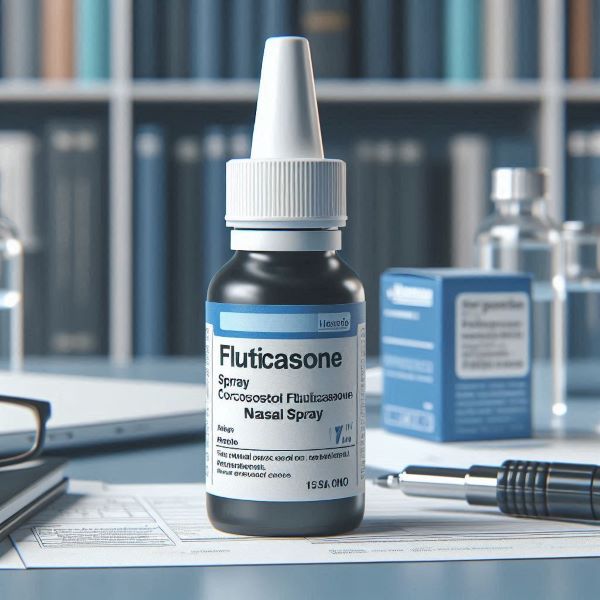Fluticasone is a potent corticosteroid widely used in managing various inflammatory and allergic conditions. Its effectiveness in reducing inflammation and suppressing immune responses makes it a valuable tool in medical practice. This article aims to provide a comprehensive overview of fluticasone, explaining its mechanism of action, uses, benefits, risks, side effects, availability, and legal status.
What is Corticosteroid Fluticasone?
Fluticasone is a synthetic glucocorticoid that mimics the action of cortisol, a hormone produced by the adrenal glands. It is available in different formulations, including inhalers, nasal sprays, topical creams, and oral inhalers. Fluticasone is commonly used to treat conditions such as asthma, allergic rhinitis, and various skin disorders. (Source)
How Does It Work?
Fluticasone works by binding to glucocorticoid receptors in the body, leading to a series of cellular events that result in reduced inflammation and immune response. It inhibits the release of inflammatory mediators, decreases the migration of inflammatory cells to affected areas, and suppresses the overall immune response. (Source)
Also, read: Quickly Know All About Corticosteroid Triamcinolone: Uses, Benefits, Side-Effects
Mechanism of Action
- Anti-Inflammatory Effects: Fluticasone reduces the production of inflammatory cytokines and mediators, thereby decreasing inflammation.
- Immunosuppressive Effects: It suppresses the activation and proliferation of immune cells, helping manage autoimmune and allergic conditions.
- Topical and Systemic Effects: Depending on the formulation, fluticasone can act locally (e.g., in the lungs or nasal passages) or systemically (e.g., via the bloodstream). (Source)
What are Its Uses?
Medical Uses
Fluticasone is used to treat a wide range of conditions, including:
- Respiratory Conditions:
- Asthma: Used in inhaler form to reduce inflammation in the airways.
- Chronic Obstructive Pulmonary Disease (COPD): Helps manage symptoms and reduce flare-ups.
- Allergic Conditions:
- Allergic Rhinitis: Nasal sprays help relieve symptoms such as nasal congestion, sneezing, and runny nose.
- Allergic Dermatitis: Topical creams treat inflammation and itching caused by allergic skin reactions.
- Dermatological Conditions:
- Eczema and Psoriasis: Topical formulations help reduce inflammation and itching in chronic skin conditions.
- Autoimmune Diseases:
- Lupus: Used to manage systemic inflammation.
- Rheumatoid Arthritis: Helps control joint inflammation and pain. (Source)
Non-Medical Uses
Fluticasone is not typically used for non-medical purposes due to its potent effects and potential side effects. It should always be used under medical supervision.
Benefits
The benefits of fluticasone include:
- Effective Symptom Relief: Provides significant relief from inflammation-related symptoms in respiratory, allergic, and dermatological conditions.
- Reduces Frequency of Flare-Ups: Helps prevent exacerbations in chronic conditions such as asthma and COPD.
- Versatile Formulations: Available in various forms to target specific conditions and areas of the body.
- Improved Quality of Life: Effective management of symptoms leads to a better quality of life for patients. (Source)
What are the Risks?
While fluticasone is effective, it comes with several risks and potential side effects, especially with long-term use.
Side Effects
- Short-Term Use:
- Nasal irritation or dryness
- Throat irritation
- Hoarseness
- Headache
- Long-Term Use:
- Osteoporosis
- Cataracts
- Glaucoma
- Suppression of adrenal gland function
- Growth retardation in children
- Serious Side Effects:
- Severe allergic reactions
- Increased risk of infections due to immune suppression
- High blood sugar levels (hyperglycemia)
Also, watch web stories: What is pranayama, one of the yogic practices, used for?
Where is it Available and Where is it Banned?
Availability
Fluticasone is widely available by prescription in most countries. It comes in various forms, including inhalers, nasal sprays, topical creams, and oral inhalers. It is a common medication in pharmacies and hospitals due to its efficacy in managing a wide range of conditions.
Legal Status
The legal status of fluticasone varies by country, but it is generally regulated as a prescription-only medication:
- United States: Available by prescription only.
- Canada: Prescription-only medication.
- United Kingdom: Prescription-only.
- Australia: Classified as a prescription medication.
- International: Most countries regulate fluticasone as a prescription drug due to its potent effects and potential for misuse.
FAQs
1. Can fluticasone be used long-term? Long-term use of it can lead to significant side effects and should only be done under strict medical supervision.
2. Is fluticasone safe during pregnancy? It should be used during pregnancy only if the potential benefits outweigh the risks. It is essential to consult a healthcare provider.
3. Can fluticasone be used for skin conditions? Yes, it is commonly used to treat various dermatological conditions such as eczema and psoriasis.
4. How is fluticasone administered? It can be administered via inhalers, nasal sprays, topical creams, or oral inhalers, depending on the condition being treated.
5. Are there alternatives to fluticasone? Other corticosteroids, such as prednisone or budesonide, may be used as alternatives, depending on the specific medical condition and patient needs.





